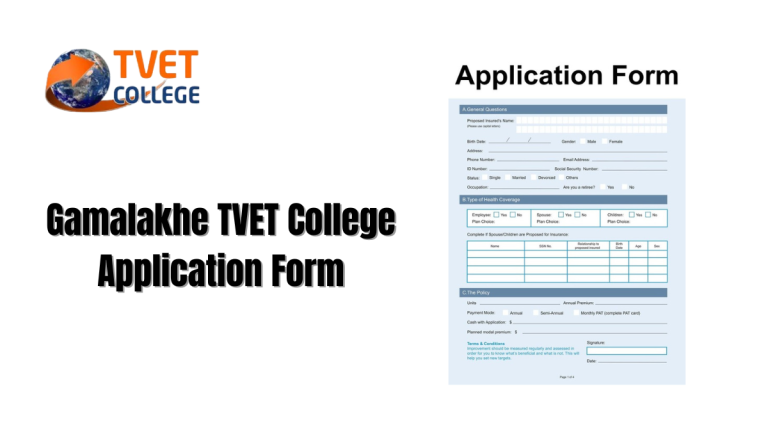Can I Study At TVET Without Matric?

Can I Study At TVET Without Matric? For many people, the question of whether they can study at TVET without matric is a common concern. Not having a matric certificate might feel like a barrier to educational and career opportunities, but Technical and Vocational Education and Training (TVET) colleges offer a practical and accessible solution. Let’s explore how TVET education empowers students without matric, the benefits of studying at TVET, and the range of options available to those eager to build skills for future success.
What is TVET, and Why Is It Important?
TVET, or Technical and Vocational Education and Training, focuses on equipping students with practical skills for specific industries. These programs offer a combination of hands-on experience and classroom learning to prepare students for work in fields such as engineering, hospitality, construction, and information technology. The demand for skilled tradespeople is high, making TVET an attractive option for those looking to build a successful career. For individuals without matric, TVET programs provide alternative pathways to develop skills and find employment.
Can I Study At TVET Without Matric?
Absolutely! Studying at TVET without matric is possible, and it’s a valuable opportunity for those who may not have completed high school. TVET colleges understand that a traditional high school path does not work for everyone, which is why they have designed programs specifically for individuals without matric. By enrolling in a TVET college, you can learn valuable trades, develop hands-on skills, and pursue qualifications that are widely recognized in various industries.
Options Available for TVET Study Without Matric
For students interested in studying at TVET without matric, several options are available:
- National Certificate (Vocational) [NC(V) Level 2-4]: The NC(V) program allows students to study up to three years in their chosen field, developing skills in areas like business studies, engineering, and technology. Students can begin the NC(V) Level 2 without matric and progress up to Level 4, which is equivalent to a Grade 12 certificate.
- Skills Programs and Short Courses: TVET colleges offer a range of short courses and skills programs that focus on specific skills. These courses are ideal for those who want to quickly gain competencies in a particular area without a long-term commitment.
- Apprenticeships and Learnerships: Many TVET colleges partner with industries to offer apprenticeships and learnerships. These programs combine work experience with training, providing students with the necessary skills to excel in a trade. Often, these programs don’t require matric as a prerequisite.
Benefits of TVET Education for Students Without Matric
Choosing a TVET education brings many benefits, especially for students who may not have had the opportunity to complete matric. Here’s why TVET is a smart choice:
- Job-Ready Skills: TVET courses focus on practical, industry-specific skills that make graduates job-ready. This is especially beneficial for students eager to enter the workforce as soon as possible.
- Affordable Education: Compared to traditional university programs, TVET courses are often more affordable. Some students may also qualify for bursaries or funding assistance through organizations like NSFAS (National Student Financial Aid Scheme).
- Flexible Learning Options: TVET colleges offer distance learning programs and flexible schedules, allowing students to learn at their own pace or balance work with their studies.
- Pathways to Higher Education: While matric may not be required to start a TVET program, certain programs offer pathways that eventually lead to higher qualifications. For example, some Level 4 qualifications can open doors to further studies at higher education institutions.
TVET Courses and Careers You Can Pursue Without Matric
TVET colleges provide numerous options in various fields. Here are some popular TVET courses that students without matric can consider:
- Engineering and Related Design: Courses in this field include welding, automotive repair, and electrical engineering, which are essential skills in the construction and manufacturing industries.
- Hospitality and Catering: Careers in hospitality, such as culinary arts, hotel management, and event planning, are available through TVET colleges. These roles are particularly accessible without matric.
- Office Administration: Students can gain valuable office management and administrative skills through TVET courses, which are widely applicable in many businesses and organizations.
- Early Childhood Development (ECD): TVET colleges offer courses for those interested in working with young children. This field has high demand, especially for those passionate about education and childcare.
Distance Learning Programs at TVET Colleges
For those balancing work or family commitments, distance learning programs through TVET colleges offer a practical solution. Distance learning allows students to complete coursework online or via correspondence, making it convenient for individuals with busy schedules. Many TVET colleges now support a variety of distance learning programs, which means you can study at your own pace from anywhere, even without a matric qualification.
Financial Assistance for TVET Students Without Matric
While TVET courses are often more affordable, financial assistance is available for students in need. Through organizations like NSFAS, students can access bursaries and financial aid specifically for TVET studies. This can ease the burden of educational expenses, allowing students to focus on their studies without financial stress. Additionally, some TVET colleges have their own bursary programs, so it’s worth inquiring directly with the college.
Building a Career Through TVET Without Matric
Many successful professionals have started their careers at TVET colleges without matric, proving that dedication and practical skills can lead to rewarding careers. In industries like construction, automotive, and information technology, employers value practical experience and specific competencies, often as much as formal qualifications. TVET graduates with hands-on training and relevant skills are highly sought after, providing a stable career path with growth opportunities.
How to Apply to a TVET College Without Matric
Applying to a TVET college without matric is straightforward. Here’s a step-by-step guide:
- Choose a TVET College: Start by researching TVET colleges that offer programs of interest. Each college may have specific programs for students without matric.
- Select Your Program: Choose the course or program that aligns with your career goals, whether it’s an NC(V) program, a skills course, or an apprenticeship.
- Complete the Application: Fill out the application form on the college’s website or in person. Some colleges may have entry assessments instead of matric requirements.
- Submit Required Documents: Provide identification, previous school records, and any additional information requested by the college.
- Apply for Financial Aid (If Needed): Reach out to NSFAS or inquire directly with the TVET college about available bursaries.
- Start Your Studies: Once accepted, attend orientation and start your journey towards a skill-based education.
Conclusion
Studying at TVET without matric opens doors to exciting and rewarding careers. With various programs, flexible learning options, and financial aid support, TVET colleges offer opportunities for those who want to build valuable skills and achieve career success. Whether you’re interested in engineering, hospitality, administration, or any other field, TVET can provide the education you need to thrive—even without matric. Embrace the chance to create a fulfilling career path and start building a brighter future with a TVET education today.












